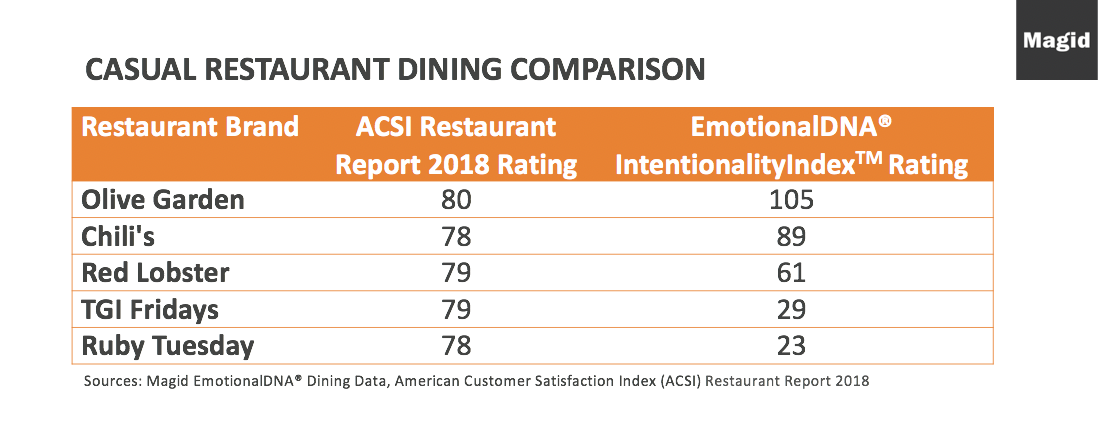Intentionality vs. Customer Satisfaction in Dining
Is customer satisfaction enough? Traditionally, restaurant chains rely on customer satisfaction as a key measure of success in determining their competitive standing. With countless options that perform well, satisfaction simply is not enough anymore. When focusing only on how satisfied a customer is, it creates risk and vulnerability.
Satisfaction is all about whether someone found a source of gratification. With so many options in the hypercompetitive restaurant industry offering a satisfying experience, it is increasingly difficult to standout. The challenge is to establish and maintain customer loyalty—easier said than done.
Enter intention, or intentionality. To be intentional is all about establishing a purpose or a goal. It requires efforts like planning and a commitment to carry out an action. It is deliberate, conscious and purposeful. Imagine knowing how deliberate consumers are in selecting restaurant brands. Are they truly engaged, or is it just a matter of convenience?
That’s why Magid has created the IntentionalityIndex™ as one of many metrics in our EmotionalDNA® Dining solution. It is a massively valuable metric in distinguishing performance that goes beyond customer satisfaction. Think about your thought process regarding your favorite restaurant. Are you a regular who often recommends the restaurant to others? Do you go out of your way to eat there? That shows a lot of intention.
The IntentionalityIndex™ measures consumer engagement across 17 different behaviors.
Behaviors with a highly positive impact on the eDNA® IntentionalityIndex
- I have a hard time not eating here
- I recommend this restaurant to others
- I go out of my way to go to this restaurant
- This restaurant is my go-to
- I rely on this restaurant to give me what I need
- When they introduce new items on their menu, I like to try them
5 Brands with Similar Satisfaction, Vastly Different Intentionality
For example, let’s look at casual dining brands with scores of 78-80 out of 100 in a recent well-respected customer satisfaction survey. While these are all similar, relatively positive scores, the eDNA Dining IntentionalityIndex tells a different story. IntentionalityIndex tells us that Olive Garden diners are far more deliberate when choosing that particular experience in comparison to a select competitive set. In fact, Olive Garden indexes above average even in the context of the entire dining landscape with a score of 105 out of 200.

Why is intentionality important? By aggregating specific behaviors, restaurants get a performance indicator that paints a fuller picture than satisfaction alone—one that can also be used to inform strategy. This intel along with other eDNA® Dining measures can identify and prioritize opportunities to positively influence competitive advantage.
Additionally, each of the behaviors that contribute to it can be studied in isolation to understand where a brand sits on those composite metrics relative to competitors, thereby delivering deeper and more specific insights to performance.
The Magid team has quantified intentionality and many other emotional and experience-based measures for 230 restaurants providing a truly expansive industry view. If you are in the chain restaurant business and want to know the eDNA Dining Intentionality Index of your brand, let’s talk.
Email us and let’s get intentional!


